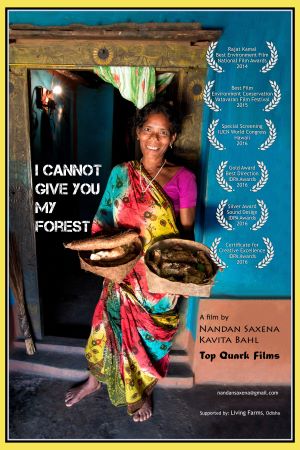
Dongar Dei Paribi Nahin (I Cannot Give You My Forest) 2014
Distributed by Good Docs
Produced by Kavita Bahl and Nandan Saxena
Directed by Kavita Bahl and Nandan Saxena
Streaming, 45 mins
High School - General Adult
Documentaries; Indigenous Peoples; Sustainable Living
Date Entered: 04/25/2024
Reviewed by Christina R. Hilburger, Research and Information Literacy Services Librarian, SUNY FredoniaDongar Dei Paribi Nahin (I Cannot Give You My Forest) offers a poignant exploration of the Kondh community's deep connection with their ancestral lands amidst the encroaching threat of industrialization and resource exploitation. Through a tapestry of visuals and personal narratives, the film paints a vivid portrait of the Kondh people, the original inhabitants of the idyllic Niyamgiri forest in Odisha, India.
At its core, the film reveals the profound symbiotic relationship between the Kondh and the forest, portraying it not merely as a source of sustenance but as an integral part of their cultural identity and spiritual heritage. Through evocative imagery and personal accounts, the filmmakers poignantly convey the intrinsic value of the forest to the Kondh, echoing sentiments of resilience, reverence, and resistance against the forces of modernity.
The opening sequences eloquently set the tone, juxtaposing the tranquil rhythms of Kondh life against the looming specter of industrialization symbolized by the intrusive presence of a train. As the narrative unfolds, viewers are immersed in the daily rituals and survival strategies of the Kondh, from foraging for food to the songs that underscore their intimate bond with the land.
Central to the film's narrative is the theme of sustainability and self-sufficiency, exemplified by the Kondh's holistic approach to life and resource management. Through intimate interviews and observational footage, the filmmakers highlight the detrimental impacts of external interventions, from government policies to corporate interests, on the delicate balance between humans and nature.
One of the film's most compelling aspects is its emphasis on the voices of the Kondh themselves, allowing them to reclaim their narrative and challenge prevailing narratives of development and progress. Through their stories of resilience and resistance, viewers gain a deeper understanding of the complexities inherent in the struggle to protect ancestral lands and preserve indigenous cultures in the face of relentless exploitation.
Dongar Dei Paribi Nahin offers a thought-provoking exploration of the enduring bond between the Kondh and the forest they depend on for sustenance, inviting viewers to reflect on the profound implications of environmental degradation and cultural loss. With its captivating visuals and heartfelt storytelling, the film serves as a powerful testament to the resilience of an indigenous community in the face of adversity.
This 45-minute documentary, honored with the Rajat Kamal National Award for Best Environment Film including Agriculture in 2014, merits inclusion in academic libraries and educational institutions seeking to engage with issues of environmental conservation, indigenous rights, and sustainable development.
Awards:Best Environment Film, National Film Awards, India; Best Film on Environment Conservation, CMS VATAVARAN Film Festival; Special Mention, Ma Planet(e) Film Festival, Metz, France
Published and licensed under the Creative Commons Attribution 4.0 license. Anyone can use these reviews, so long as they comply with the terms of the license.